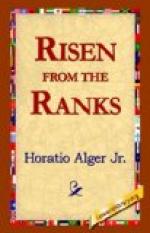“I can say, for one, that I never knew it,” said Tom.
“Nor I.”
“Nor I.”
“We used to call her Sukey Baker,” said Abner. “She used to go to the deestrict school along of Mother. They was in the same class. I haven’t seen your mother since you was a baby. How many children has she got?”
“I must decline answering your impertinent questions.” said Fitzgerald, desperately. He began to entertain, for the first time, the horrible suspicion that the pedler’s story might be true—that he might after all be his cousin. But he resolved that he never would admit it—never! Where would be his pretentious claims to aristocracy—where his pride—if this humiliating discovery were made? Judging of his school-fellows and himself, he feared that they would look down upon him.
“You seem kind o’ riled to find that I am your cousin,” said Abner. “Now, Fitz, that’s foolish. I aint rich, to be sure, but I’m respectable. I don’t drink nor chew, and I’ve got five hundred dollars laid away in the bank.”
“You’re welcome to your five hundred dollars,” said Fitz, in what was meant to be a tone of withering sarcasm.
“Am I? Well, I’d orter be, considerin’ I earned it by hard work. Seems to me you’ve got high notions, Fitz. Your mother was kind of flighty, and I’ve heard mine say Cousin Jim—that’s your father—was mighty sot up by gettin’ rich. But seems to me you ought not to deny your own flesh and blood.”
“I don’t know who you refer to, sir.”
“Why, you don’t seem to want to own me as your cousin.”
“Of course not. You’re only a common tin-pedler.”
“Well, I know I’m a tin-pedler, but that don’t change my bein’ your cousin.”
“I wish my father was here to expose your falsehood.”
“Hold on there!” said Abner. “You’re goin’ a leetle too far. I don’t let no man, nor boy neither, charge me with lyin’, if he is my cousin, I don’t stand that, nohow.”
There was something in Abner’s tone which convinced Fitzgerald that he was in earnest, and that he himself must take care not to go too far.
“I don’t wish to have anything more to say to you,” said Fitz.”
“I say, boys,” said Abner, turning to the crowd who had now formed a circle around the cousins, “I leave it to you if it aint mean for Fitz to treat me in that way. If he was to come to my house, that aint the way I’d treat him.”
“Come, Fitz,” said Tom, “you are not behaving right. I would not treat my cousin that way.”
“He isn’t my cousin, and you know it,” said Fitz, stamping with rage.
“I wish I wasn’t,” said Abner. “If I could have my pick, I’d rather have him,” indicating Tom. “But blood can’t be wiped out. We’re cousins, even if we don’t like it.”
“Are you quite sure you are right about this relationship?” asked Henry Fairbanks, gravely. “Fitz, here, says he belongs to one of the first families of Boston.”




